Pix of Carlton Crit
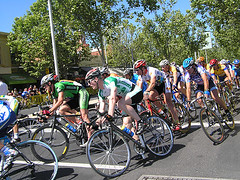 Here's several lovely piccies taken by Bikesoiler and moi at todays Stage 7 of the Herald Sun Tour, plus a few of the a.b "petit déjeuner" crew and poor Tims face. eccchhhh. Apparently in the last lap there was a ugly stomping incident, cyclingnews should have any news of this soonish. Also relating to 'news of this soonish' sort of events, peruse either Armagnac'd, Brownie or His Excellency for reports of last nights Northcote grog blog. Sorry we didn't stick around longer, had the above mentioned event to rack off to. BTW, did Mallrat rock up? Just curious.
Here's several lovely piccies taken by Bikesoiler and moi at todays Stage 7 of the Herald Sun Tour, plus a few of the a.b "petit déjeuner" crew and poor Tims face. eccchhhh. Apparently in the last lap there was a ugly stomping incident, cyclingnews should have any news of this soonish. Also relating to 'news of this soonish' sort of events, peruse either Armagnac'd, Brownie or His Excellency for reports of last nights Northcote grog blog. Sorry we didn't stick around longer, had the above mentioned event to rack off to. BTW, did Mallrat rock up? Just curious.Saturday Age: The new golf This article reads like an uninspired composite of similar Melbournites seized by wacky new cycling craze style stories that The Age has published in recent years. And the paragraphs pertaining to CM are a fecking lazy cut n' paste lifted direct from teh interwebbie. Ho hum. Goodluck to everyone on the ATB tomorrow. May the wind be at your back. May the sun shine warm upon your face. May it not be like 2003. Oh, sorry, don't mention the war... :)
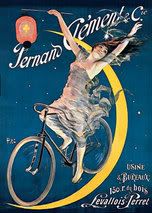
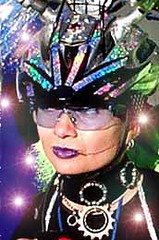



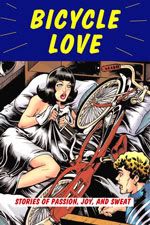



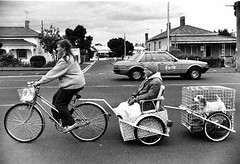
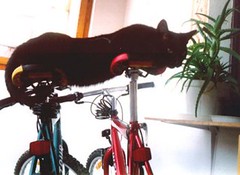
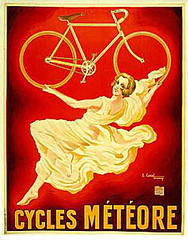
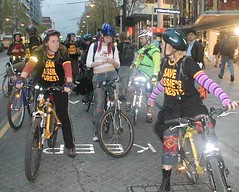
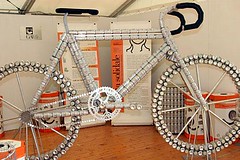
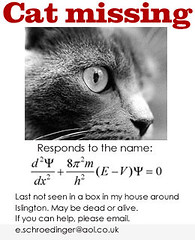

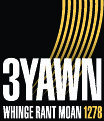
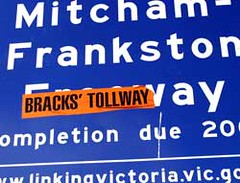








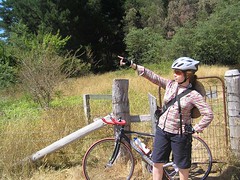
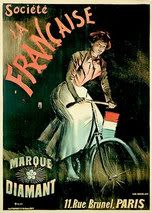
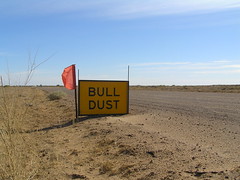


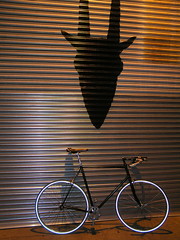



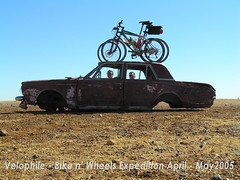
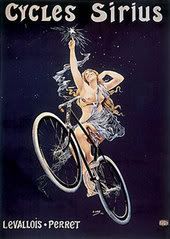
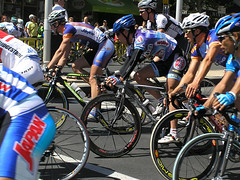

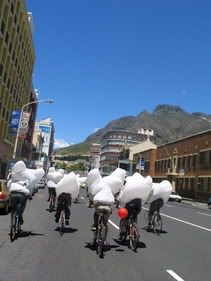
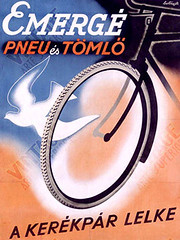

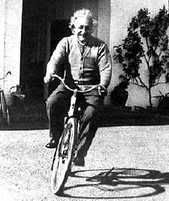
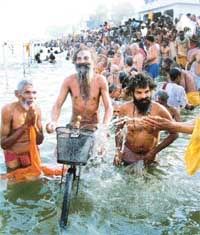
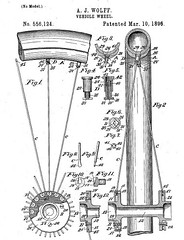
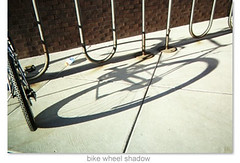
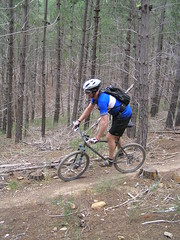

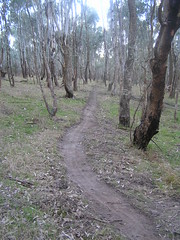
3 Comments:
greetings cileo - it really was great to meet you. grog blogs are groovy.
By BwcaBrownie, at 11:18 pm, October 16, 2005
BwcaBrownie, at 11:18 pm, October 16, 2005
re the murder of SA cyclist Ian Humphrey: you wondered -
Can anyone give a headsups on the case being delayed?
Today Monday The Australian has a feature headlined:
'Is something rotten in the state of South Australia and, if so, would its citizens ever find out about it? The state's judiciary has the highest suppression rate in the country.'.
is that a clue dya think?
By BwcaBrownie, at 3:07 pm, October 17, 2005
BwcaBrownie, at 3:07 pm, October 17, 2005
Ahh...yes...
The Australian: Secret society [October 17, 2005]
A deeply embedded inferiority complex has caused the police, judiciary and government to keep South Australians in the dark, write Tom Richardson and Verity Edwards
October 17, 2005
IS something rotten in the state of South Australia and, if so, would its citizens ever find out about it? The state's judiciary has the highest suppression rate in the country. Last month, a suppression order on allegations of cannibalism in the infamous Snowtown murder case was lifted after three years, and even then the claims were all but ignored by the state's daily newspaper, The Advertiser.
Bad news can be hard to come by and, some claim, that is just the way the state Government, the courts and the local media like it.
Adelaide University criminologist Allan Perry believes the city's entrenched culture of blissful ignorance is no accident. He recognises "a mentality that desires to suppress things that will reflect negatively" on the state. "I think far too much is suppressed ... under the guise of trying to preserve and protect the best interests of justice, because of the fear that it will reinforce negative perceptions that already exist outside of South Australia," Perry says.
"Adelaide is a city that possesses a certain sense of inferiority compared to the larger eastern capital cities. It sees itself as being an equal of those places [but] it is really the equivalent of a small provincial city ... this is a fact that it is unwilling to accept, so it has created a form of almost mass hysteria in which it tries to engage in a certain amount of self-delusion ... through the wearing of rose-coloured glasses," Perry says.
University of South Australia associate professor of journalism Ian Richards believes Adelaide's "small-town mentality" stems from a feeling of "alienation" from the rest of Australia. "I think it's commercially driven," he says. "I think they do a lot of market research and they think it's what the people want ... They respond to ratings and commercial decisions."
According to Richards, the State Bank collapse under John Bannon's Labor government in the early 1990s contributed to a feeling that the public needed protection from adverse publicity. That event was a singular catastrophe for the state's self-confidence, one from which it has not recovered. "There's still an aftermath of the State Bank collapse ... It's taken a while to get over that," Richards says.
Some critics believe the state's malaise preceded, even contributed to, the bank's demise. In his book State of Denial, writer Chris Kenny, now a press secretary for the Howard Government, points to "parochialism" as a key reason why the bank's problems were able to manifest with so little scrutiny. "It affected the bank, the media, the government and the opposition", Kenny writes, and it was embodied in the SA Great organisation. The group, a conglomeration of Adelaide's business elite, co-ordinated publicity campaigns talking up the state and its people.
"No one who saw the television advertisements could forget the shots of hard-working people giving viewers the thumbs-up and telling them, 'It's our state, mate'. The State Bank was a way for SA to be great. To attack it was to attack the festival, or the Crows, or fritz [processed meat]," writes Kenny.
Former Liberal MP Jennifer Cashmore understands only too well how hard the SA Great spell can be to break. Under the Bannon government, she laboured in state parliament to raise concerns about the financial security of the bank. "It was as plain as plain that we were horribly exposed; it was staring everyone in the face but no one wanted to believe it," she says. "You wouldn't describe it as being a suppression of information, more a denial of reality by the premier and the financial community."
She says that "culture of denial is exacerbated by the fact that [Adelaide is] a relatively small and close-knit community". "That has its great advantages, but also means that many people are reluctant to blow the whistle, because they might be blowing it on their best friends ... or people upon whom they depend for social or financial benefit. I think it's deeply embedded in South Australia and I don't really think that those lessons have been learnt." Cashmore is scathing of the local media for failing to adequately investigate the looming State Bank disaster.
But the SA Great concept had become a mantra, certainly for Bannon, who touted key projects such as the state's Grand Prix as emblems of South Australia's independence and success. He was ably assisted by the local media, which then included both The Advertiser and the now-defunct The News. In the same way, almost two decades later, the incumbent Rann Government talked up SA-based shipbuilding company ASC's successful bid for a $6 billion air warfare destroyer contract as a victory both for the state and its government. Rann had a willing ally in the media, with The Advertiser's front page on Wednesday, June 1, 2005 lauding the successful bid as "V-DAY: Our Greatest Victory".
Advertiser editor Melvin Mansell makes no apology for promoting South Australia. "I don't think 'parochial' is a bad word," he says. "Every media organisation in Australia is parochial. Melbourne and Sydney television news is all about Melbourne and Sydney."
The paper has long campaigned against the increasing incidence of judicial suppression orders, which Mansell blames on a judiciary with a "superiority" complex. "I think there's an element historically and even today within the judiciary that we as lay men and women are not qualified to make some sort of rational judgment on the decisions they make in court, that we won't understand it."
"I think it goes back to the days when North Adelaide [the traditional home of the Adelaide elite] ruled the rest of the state. It became a part of government and a part of the ruling class. Only a very small number of people were allowed to know what was going on and information was very tightly controlled. What hasn't changed in the judiciary is we still have a ridiculous number of suppression orders ... They don't want people to know what's happening in their state."
In the Snowtown trial 220 suppression orders were imposed as the jury heard evidence between 1999 and 2003. Suppression orders peaked in South Australia at 328 in 2000-01, falling to 176 in 2004-05. The figures are far higher than those in Victoria, which has just topped 130 for this year. "Do we have worse cases or do we have a different system?" asks Mansell. "I think what it comes down to is this confidence in the system and a desire to control information."
Despite a campaign against heavy-handed suppression orders, The Advertiser did little with the Snowtown cannibal story when it was allowed to publish. While other Adelaide media outlets led bulletins with the grisly revelations, Mansell ran a few paragraphs at the bottom of page 15. "We try to be a family paper ... as a rule, we don't even publish pictures of dead bodies," he says.
Mansell believes the Government, judiciary and police are "duplicitous" in withholding information. "Their intentions are the same, and that's really to tell people as little as they can."
The tyranny of proximity nurtures a symbiotic relationship between the Adelaide media and the Government, with many press secretaries drawn from the ranks of local journalists. However, this cosy kinship does not appear to extend to the judiciary. As one legal source observes: "I think many in the South Australian judiciary have a long-standing antipathy to the media, and I think that can be reflected in the [number of] suppression orders."
South Australian courts are given the power to suppress publication of information by Section 69A of the state's Evidence Act. Perhaps the most significant amendment to the act was made in 1984 by then attorney-general Chris Sumner, whose laws provided for appeals against an order by "a representative of a newspaper or a radio or television station" or "any person who satisfies the court that he has a proper interest".
"It's true that South Australia had a higher rate of suppression orders," Sumner says. "I think there has been a culture in South Australia of greater suppression [and] although one can change the law, it's difficult to change that culture."
Robert Lawson, legal affairs spokesman for the state's Liberal opposition, is "concerned about the number of suppression orders, their duration and the difficulty in obtaining details about them". He proposes a provision for the automatic removal of suppression orders after court proceedings are concluded and a requirement that a judge or magistrate clearly state the reasons for making the order.
But the Opposition's push to loosen the legislation is not indicative of the prevailing attitude in parliament. A recent parliamentary legislative review committee recommended that the names of all accused persons be suppressed until conviction. "What we're getting from the Labor members is further suppression of information ... our fundamental philosophy is that the courts should be open, and that the public is entitled to know all the details about criminal trials unless there's a very real probability of trials being compromised," Lawson says.
Attorney-General Michael Atkinson says the media should have the right to report court proceedings, "including the names of the accused and the witnesses". "I think there's a public interest in that."
The state's Bar Association president Jonathan Wells QC emphasises that the issuing of suppression orders balances two key notions of justice: that it be done, and that it be seen to be done.
"If you're actually serious about the presumption of innocence, one can understand why people shouldn't be identified and suffer the collateral damage that occurs from that ... the countervailing consideration is that the community is entitled to know and be appraised of accusations," says Wells.
By cfsmtb, at 3:12 pm, October 17, 2005
cfsmtb, at 3:12 pm, October 17, 2005
Post a Comment
<< Home